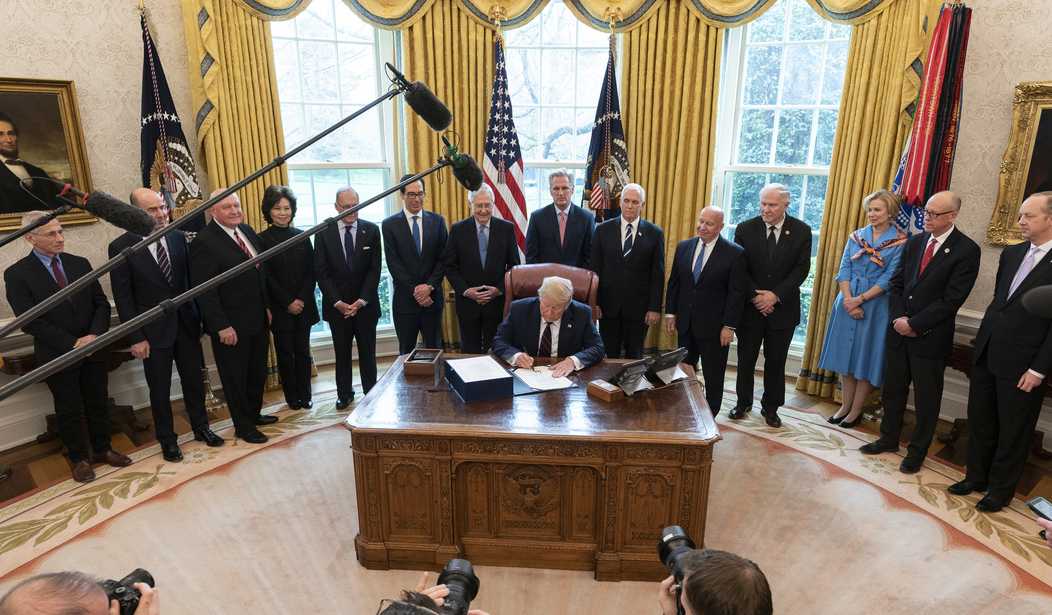In terms of social pressure, it’s hard to imagine a more important ‘must-pass’ piece of legislation than the recently passed $2 trillion coronavirus relief bill. Right or wrong, the government is essentially forcing businesses to close and people to be out of work in order to fight the spread of coronavirus, and thus any shred of morality on the part of said government officials would dictate that the government has a responsibility to at least help care for those out of work folks until the crisis has passed, even if that means borrowing trillions to do so.
Still, there are plenty of things we already know are wrong with this bill (did we really need a few extra million for the Kennedy Center right now?) and plenty of faults yet to be discovered, especially given that most legislators wouldn’t have had time to fully examine its contents before being forced to vote on it. One thing we do know about, however, is a supposed “drafting error” that gives an extra $600 per week for four months to anyone drawing unemployment compensation ON TOP of what they would ordinarily make in unemployment. This drafting error, as Nebraska Sen. Ben Sasse explained in a statement, would create a “perverse incentive for Americans to not work.”
“As it’s currently drafted,” Sasse said, the bill “threatens to cripple the supply chain for many different categories of workers, some in healthcare, some in food prep and food delivery” and “creates a perverse incentive for men and women who are sidelined to then not leave the sidelines and come back to work.”
Sasse and others, including South Carolina Sens. Tim Scott and Lindsey Graham, tried to fix the issue by including a simple amendment that would have prevented unemployment benefits from actually exceeding what someone previously earned, but it was summarily shot down well short of the 60 votes it would have taken for passage. So we’re left with an issue that, according to Sasse, will “exacerbate our problems” and force Congress to “be back here in a month and in two months trying to fix” them. Yeah, good luck with that.
Recommended
Granted, those who voted to keep the $600 likely found it difficult to bend against the politics of ‘helping’ those in need during a critical time in our history. After all, never before have so many Americans been denied their livelihoods by their own government. However, when the coronavirus crisis does pass, and it will, what happens when businesses try to ramp up their workforces in order to meet the inevitable demand surge? Will lower-skilled yet crucial laid-off workers resent being called back to work to take a pay cut? And if/when additional help is needed, good luck trying to coax anyone out of the house with the tempting sales pitch of hard work AND less money than they are currently making sitting on the couch watching Netflix.
Before you try to argue that most people would always choose a ‘permanent’ job, remember that low skilled employers had enough difficulties hiring and keeping people during normal times. This is a workforce that can leave at the drop of a hat only to walk in somewhere else and begin working the next day, and yet they are absolutely crucial to maintaining the underpinnings of a strong U.S. economy.
In a piece about the issue for liberal website Slate, Jordan Weissmann argued that the issue is actually “not a drafting error,” but rather a “design feature of the bill” that conservative lawmakers simply are “unhappy with.” While the writer isn’t “overly concerned about incentivizing service workers to stay home during a plague,” he does acknowledge that the qualms of those concerned about the future ramifications of the bill “aren’t entirely insane.”
“Usually, Americans can’t collect unemployment if they walk out on their jobs,” Weissmann writes. “But the coronavirus bill—or at least a draft version that a Hill aide told me was current … makes an individual who has to ‘quit his or her job as a direct result of COVID-19’ eligible. ‘Direct result’ isn’t super well defined in that section (and I’m not sure how it’d be policed), so you can definitely imagine a scenario where some important workers decide to go on unemployment insurance rather than keep working for a business that can’t afford to give them a raise at the moment.”
In other words, not only will hiring and rehiring become a future problem when this crisis has passed, but keeping one’s workers RIGHT NOW if you need them to, you know, stay in business, could be a tremendously devastating unintended consequence. How many lower-wage people will simply choose to quit their jobs because they are “concerned” about contracting coronavirus? How is a restaurant trying to stay afloat by doing take-out, a factory trying to produce much-needed goods, or a farmer trying to get the crops planted supposed to do all those things if our government will pay their workers more money to simply stay home?
The Slate writer called Lindsey Graham’s alternative idea of simply giving laid-off workers 100 percent of their salary during the crisis a “pretty reasonable” approach that he would be “kind of tempted to accept” if he were a congressional Democrat. However, the “ancient IT systems” currently used to administer state unemployment benefits make such a common-sense approach impossible.
Somehow though, I doubt Democrats would have accepted such a “reasonable” solution, even if it were technically possible. They’re too keen on taking full advantage of this crisis. And such a scenario, where workers are literally better off on the government dole than working, is just too perfect for those who want to someday turn the entire United States into a socialist hellscape.
Follow Scott on Twitter @SKMorefield

























Join the conversation as a VIP Member